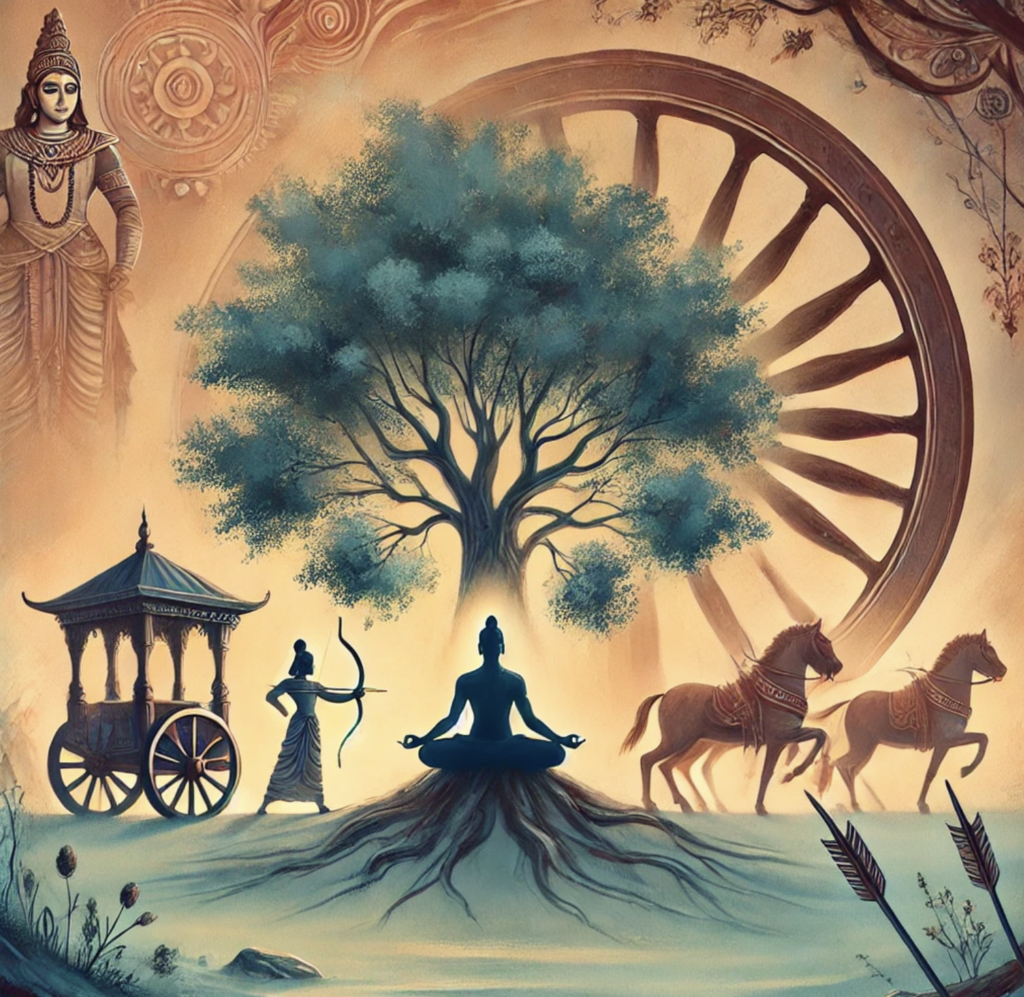Karma, the universal principle of cause and effect, transcends cultural boundaries and spiritual traditions, offering profound insights into the interconnectedness of life. Rooted in ancient wisdom, the idea that “karma returns back” is not just a moral directive but a philosophical lens through which we can understand the ripple effects of our actions. Psychologically, it serves as a framework for accountability, self-reflection, and emotional growth, reminding us that the energy we emit into the world inevitably shapes our own experiences.
Essence of Karma
Karma operates on the foundational principle of balance in the universe. Every thought, word, and deed sends energy into the world, which eventually returns to its source. This reflects the cyclical nature of existence – birth, death, and rebirth and underscores the interconnectedness of all beings.
In the Bhagavad Gita, Krishna explains to Arjuna the inevitability of consequences. Actions driven by selfishness, anger, or greed create disharmony, while those rooted in compassion, love, and selflessness lead to peace and fulfillment. This perspective aligns with the broader Vedantic idea that our individual lives are threads in the vast tapestry of existence. Each thread influences the whole, reinforcing the need for mindful and harmonious living.
The Psychological Impact of Karma
From a psychological perspective, the concept of karma promotes self-awareness and personal responsibility. When we acknowledge that our choices have consequences, we are more likely to:
Reflect on Our Actions: Understanding the impact of our behavior fosters emotional intelligence and empathy.
Cultivate Positive Habits: Knowing that our actions shape our experiences motivates us to engage in constructive behaviors.
Develop Resilience: Accepting responsibility for our actions helps us learn from failures and grow stronger.
Karma also addresses the human need for justice and fairness. While the world may seem chaotic and unjust, the principle of karma assures us that every action, good or bad, will eventually find its balance.
Insights from the Mahabharata
The Mahabharata, one of the greatest epics of Indian philosophy, provides vivid illustrations of karma in action:
Duryodhana’s Greed: His unrelenting desire for power and wealth led to the destruction of his family and kingdom. His actions, driven by jealousy and hatred, set in motion a cycle of events that culminated in the devastating war of Kurukshetra.
Karna’s Loyalty: Karna’s unwavering allegiance to Duryodhana, despite knowing the moral implications, highlights how misplaced loyalty can invite negative karma.
Pandavas’ Resilience: Despite facing hardships, the Pandavas adhered to dharma (righteousness), eventually reaping the rewards of their perseverance and integrity.
These stories remind us that karma doesn’t operate on a linear timeline but always manifests, teaching us lessons and shaping our journey.
The Philosophy of Detachment
A core teaching of karma is the need for detachment from outcomes. The Bhagavad Gita advises focusing on one’s actions without being overly attached to the results. This is not about indifference but about surrendering to the natural flow of life. Philosophically, detachment fosters inner peace by reducing anxiety and allowing us to act with clarity and purpose.

Applying Karma in Modern Life
Mindful Action and Ethical Living
In today’s fast-paced world, karma encourages us to slow down and act mindfully. Ethical choices, whether in personal relationships or professional settings, create a foundation for lasting success and fulfillment.
Overcoming Negative Patterns
The psychological aspect of karma helps us break free from destructive cycles. By reflecting on the consequences of past actions, we can identify and correct patterns of behavior that no longer serve us.
Building Harmonious Relationships
Karma reminds us that our interactions with others are a two-way street. Acts of kindness and understanding not only enrich others’ lives but also nurture our emotional well-being.
Accepting Life’s Uncertainties
The principle of karma teaches us to embrace uncertainty. Not every consequence is immediate or apparent, but trusting the natural balance of the universe helps us navigate challenges with grace.
Philosophical Reflection: The Eternal Soul
Krishna’s teachings in the Bhagavad Gita emphasize the immortality of the soul. While our actions shape our earthly experiences, the soul remains untouched, evolving through each life. This perspective encourages us to transcend material attachments and focus on spiritual growth.
Recognizing the eternal nature of the soul reframes karma as a tool for self-realization rather than a system of punishment or reward. It shifts the focus from external validation to inner harmony, reminding us that true fulfillment comes from aligning with our higher purpose.
Living the Wisdom of Karma
Karma is not just a spiritual doctrine; it is a practical guide for leading a meaningful life. By understanding its principles, we can:
- Make decisions that reflect our values and contribute to the greater good.
- Approach challenges as opportunities for growth rather than setbacks.
- Foster gratitude for life’s blessings and compassion for those in need.
Conclusion: The Timeless Truth of Karma
The law of karma is a profound reminder of life’s interconnectedness and the power of our actions. Philosophically, it calls us to align with the natural order of the universe. Psychologically, it empowers us to take responsibility for our choices and their consequences.
By embracing the principles of karma, we cultivate a life of balance, integrity, and fulfillment. In a world that often prioritizes immediate gratification, the timeless wisdom of karma encourages us to act with mindfulness, compassion, and a sense of purpose. Through this understanding, we not only transform our own lives but also contribute to the harmony of the world around us.
Stay connected with us at www.theknowledgenexus.in for more profound insights, timeless wisdom, and practical lessons
Disclaimer:
The content on this website is intended for informational purposes only, offering insights derived from the Mahabharata, Ramayana, and Bhagavad Gita. Interpretations may vary as these are deeply subjective matters and may be viewed differently across cultures and perspectives.





One thought on “Transforming Life Through Mindful Actions and Choices – The Law of Karma”